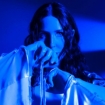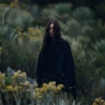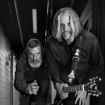Chelsea Wolfe has escaped into the woods and she's not about to come back. You'll find the singer-guitarist in the mountains of Northern California, hours from her Sacramento hometown, where the closest she gets to city life is in some tiny, ancient hamlets left behind from the Gold Rush days.
It's quiet up there, which might help explain the acoustic direction of her next album, a mostly solo project she's been writing and recording in her living room, her garage, wherever there's space to dig into Wolfe's new songs that are both intimate and biting, delicate and fierce. As an artist, she was already hard to pin down, with elements of folk, goth, post-punk, industrial, metal and more woven deep into her grooves. "I move in extremes, hot or cold," she says. "I tend to combine those two things at all times."
The still-untitled album is a left turn from the explosive rock guitars that dominated 2017's acclaimed Hiss Spun, with its churning songs of white noise and epic melodies. This year, she returns to her core inspirations, and the playlist Wolfe is spinning on infinite loop are recordings by Townes Van Zandt and Neurosis, Johnny Cash and David Bowie, disparate songwriters who cut deep. That makes the new album a kind of follow-up to her smoldering 2012 release Unknown Rooms: A Collection of Acoustic Songs, which gathered leftover folk tunes of a certain understated volume that hadn't fit on her other albums.
This one is different in that Wolfe is building this collection from the ground up, intentionally working within her own version of folk on songs written over the last year. She has longtime collaborator Ben Chisholm co-producing and engineering, and occasional guest players to add subtle layers of sound, including drummer Jess Gowrie. But she is determined to make this a solo project as raw and as cooked as the early country music and folk she heard growing up, with a modern message suited to the moment.
With Hiss Spun, her following only grew wider, and she's seeing fans with her lyrics tattooed to their skin. Wolfe is responding with new songs that both embrace and challenge, exploring the trials and triumphs of feminism, present and past, within an ever-changing world order that she's encouraged to see has a new wave of women rising to power in the U.S. Congress.
"I just follow my instincts and I follow all the strange and different voices that live inside me and I don't hold them back," says Wolfe, "especially not anymore."

YOUR LAST ALBUM, HISS SPUN, HAD A LOT OF EXPLOSIVE GUITAR MOMENTS. IS THIS ACOUSTIC RECORD A REACTION AWAY FROM THAT?
CHELSEA WOLFE Honestly, I didn't know exactly what I was going to do next. I was so completely enveloped and focused on doing that record. And it was cathartic for me. That record felt very internal, but very explosive, as well, letting a lot of things out I hadn't thought about or talked about before. Maybe the natural reaction to that is to retreat into the wilderness and just write a really quiet album. It's introspective, but it's also about the history of women and what we've gone through over these years and how a lot has changed, a lot hasn't changed.
IS THAT INSPIRED BY RECENT EVENTS IN THE WORLD?
I'm sure it is. Part of it has to do with just being a woman and getting older and understanding things more and just feeling that really visceral reaction to the way women are treated and seeing it on the daily in our society and on the news.
THIS ISN'T YOUR FIRST ACOUSTIC PROJECT. DO YOU GET A DIFFERENT FEELING ONSTAGE WHEN YOU'RE ALONE VERSUS BEING WITH A BAND AND HAVING AN ELECTRIC GUITAR IN YOUR HANDS?
I haven't done shows by myself onstage in a really long time and it's not so easy for me. It's definitely more comfortable to have your band with you and to be able to lose yourself in all these sounds and things that you're creating together. But I also feel really ready and excited to do that, even though it's scary. I like to push myself into new territories musically and physically. Heavy music can be really intimate, and solo can be very intimate. So in a way it's the same thing, being up there and baring your soul for people.

HOW IS THE NEW RECORD BEING MADE?
I'm recording it at home. Originally, I really wanted to do everything myself. Sometimes as a female artist, if one man is involved with one little thing on your record, they end up getting a lot more credit for it. I was being a little defensive at first. But as I started approaching it, I felt like that was actually a very lonely way of doing things and it didn't sound like much fun. So I decided to involve Ben, and he's helping engineer it so that I can just focus on recording the parts and not having to run back and forth to the board or computer.
I really wanted to play every song just with me and an acoustic guitar. That was important for me. So they all started in that way. We might add some electric guitar, or some kind of electronic beats to it.
I sat down with Ben and that really helped me finish everything — we would talk about a song and then I would run upstairs to my writing room and suddenly have all these lyrics that finished a song.
HOW ARE THE NEW SONGS RELATED TO SOME OF THE QUIETER MOMENTS ON HISS SPUN?
I think it's different. I did Unknown Rooms, which was a compilation of a lot of acoustic songs I'd written over the years. They were just written with the idea of playing them as a solo artist in mind. I think every record definitely is going to have some heavy moments and some soft moments. Abyss had "Crazy Love" and Hiss Spun had "Two Spirit." It's just part of me to oscillate between the two.

CAN YOU TELL ME ABOUT ONE OF THE SONGS?
One is called "Be All Things." It's very introspective and it's very triumphant. Conceptually, it's about a Victorian-era woman who is a maiden but very much wants to be a warrior — and just thinking about nature and environmentalism and how long that has been a problem and how we're trying to make changes but still we're just destroying the earth. Just when it seems like something's changing, it just gets worse. I think my music in general represents the soft and the strong, embracing the feminine and masculine of myself. This album is very much along the theme of that dichotomy. And I think a lot of people can relate to that, as well, whether it's a man or woman, a non-gender-specific person. I think a lot of people are starting to embrace that about themselves, the soft and strong, and then really finding that empowering.
DID THAT COME AS A REACTION TO SOMETHING?
It's a bit of a reaction, but it's also just something that's really been a part of me for a long time. I'm not just one thing. You can't really put me or my music into a box. Sometimes that's frustrating for me because I think maybe it holds me back in a way, but then sometimes I think that is why I've been able to do what I do and why I have any kind of success as an artist and a musician. I'm saying in the song: "I want to be all things." I don't want to be held back anymore and I don't want to feel like I need to quiet my voice. I just want to be who I am and be free.

IT SEEMS LIKE A LOT OF PEOPLE FEEL THAT WAY. JUST LOOK AT HOW MANY WOMEN WERE RECENTLY ELECTED TO CONGRESS.
Exactly. It's amazing. And I think it's very indicative of this time and more and more women and non-gender-specific people are really starting to speak up for themselves and let go of the fear of that. So that's definitely a strong theme with this new album.
HOW HAVE YOU EVOLVED AS A LYRICIST SINCE YOUR FIRST RECORDS?
I'm a much better writer and I'm taking the time to really make sure I'm saying the right thing. As a younger artist, I would just write a song and then that was it. I never really went back and fixed up the lyrics or changed a word if I didn't like it. I love words and I love reading and I love thinking about language and how to make something sound the best way but also infuse a lot of meaning into even just a short phrase. On this new album, I'm using some archaic language to talk about new things.
HOW ARE YOU USING ARCHAIC LANGUAGE?
I was spending some time with my great-grandmother before she died and I would often write down a word here and there that you don't hear anymore. Jess is very much like that, too. She was raised by her grandparents, so she has a lot of cute old phrases that she says that you don't hear very often. There's a moment [on the record] with the word "daylight plumed my skin." That's something I've probably read in some old poetry books. It's something sensual, and I'm always trying to bring sensuality into language and keeping that alive because I feel like sometimes that is a dying art.

ASIDE FROM YOUR OWN TOURS OVER THE LAST YEAR, YOU DID TOURS WITH MINISTRY AND A PERFECT CIRCLE. HOW DID THAT GO?
I'm such a big fan of Ministry and they're really great — but I don't think their audience was as open as I thought they might be. So it was a little bit tough if I'm honest. I got really aggro on the Ministry tours because sometimes it felt like their audience was just looking at us with disgust. Not all of them. Of course, there were some really nice people that wanted to be open to it. It ended up being fun and it brings you and your band closer together, too. I just took it as another learning experience.
Al [Jourgensen] was so great and he would invite us onto his bus after the show and just talk about music and stuff for a long time. We would overhear him describing us to other people, talking about me and Jess: "They're women and they're angry and they're making good music!" It was really cute.
A Perfect Circle was very different. Their audience was a lot more accepting of us for some reason. Definitely bigger venues than I've ever played. I have a long way to go in knowing how to work a room of 8,000 people because that's totally different than what I'm used to be playing. Maynard actually invited us out to his winery. We got to experience his wine and homegrown vegetables and stuff. It was really cool.
YOUR FANS SEEM WILLING TO FOLLOW YOU THROUGH YOUR SHIFTS IN TONE. AND NOBODY REALLY KNOWS WHAT THEY LIKE UNTIL THEY SEE OR HEAR IT.
That's true. And I think it makes you a better artist when you do things that people aren't expecting. It's like when I heard Black Sabbath doing the song "Changes" the first time — after hearing all their other heavy music. Them doing something so touching and intimate helped me understand the freedom to just sing whatever song is calling to you.














